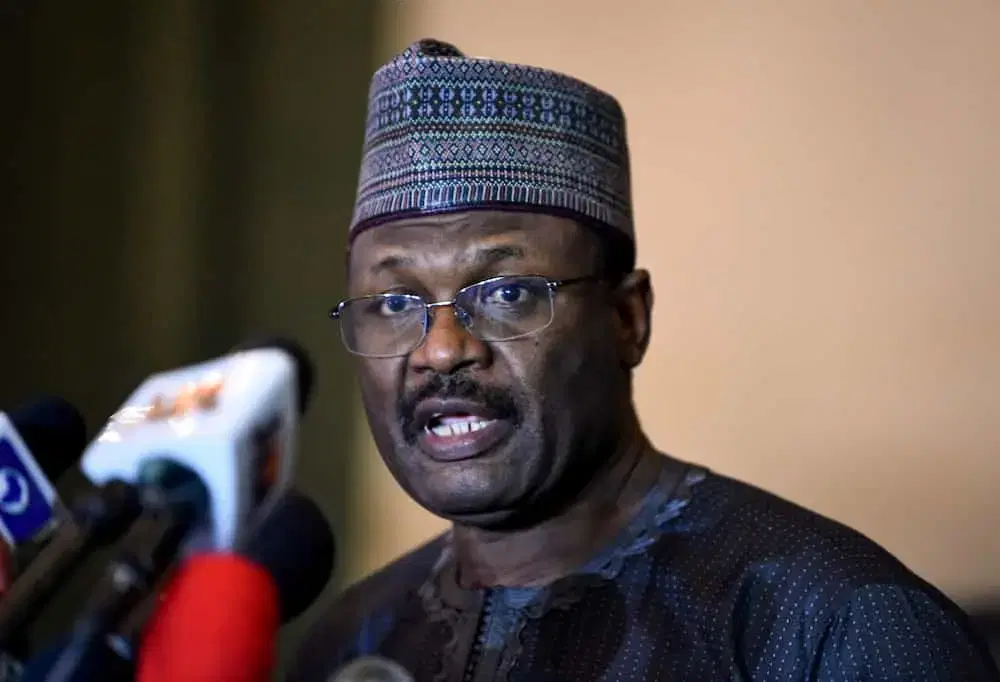Professor Mahmood Yakubu, former Chairman of the Independent National Electoral Commission (INEC), has explained that his decision to step down was aimed at creating room for the appointment of a new leader who can begin preparations early for the country’s upcoming electoral activities.
Yakubu formally handed over leadership to May Agbamuche-Mbu, a national commissioner, who will now serve as the Acting Chairman of INEC. The brief handover ceremony took place on Tuesday at the commission’s headquarters in Abuja during INEC’s routine consultative meeting with Resident Electoral Commissioners (RECs).
Speaking during the ceremony, Yakubu stated that his resignation was in line with the provisions of Section 36 (1) and (2) of the 1999 Constitution (as amended).
“I have taken a decision and conveyed the same as provided by Section 36, Subsections 1 and 2 of the Constitution of the Federal Republic of Nigeria,” he said.

“In the interim, I am handing over to one of the most senior national commissioners by date of appointment. Following consultations with other national commissioners, Ms May Agbamuche-Mbu will serve in an acting capacity pending the appointment of a substantive chairman,” Yakubu added.
He explained that stepping aside at this time would allow the incoming chairman to “settle down quickly to the task of conducting elections and other electoral activities in Africa’s most demographically and logistically complex environment.”
Reflecting on his decade-long tenure, Yakubu said he understood the magnitude of the challenges ahead, having been privileged to serve for 10 years, with only a few weeks remaining before the official end of his term.
He expressed deep appreciation to all members of the commission and the Resident Electoral Commissioners for their cooperation and shared commitment.
“Since 2015, I have worked with 24 national commissioners and 67 RECs,” he noted. “I will forever cherish the support of successive secretaries and INEC staff nationwide. Together, we innovated and managed the commission’s enormous responsibilities, sometimes under tremendous pressure.”
Yakubu also acknowledged the backing of key institutions and stakeholders — including the National Assembly, political parties, civil society organisations, the National Peace Committee, security agencies, the media, and the National Youth Service Corps (NYSC) — for their contributions toward electoral progress.
“Above all,” he added, “I thank Nigerians for their comments and criticisms. They encouraged rather than discouraged us to persevere.”
Highlighting some of the commission’s key achievements under his leadership, Yakubu said INEC made significant strides in innovation, transparency, and digital transformation.
He stated that the commission consolidated its biometric voter register and replaced several manual procedures with digital platforms and applications. These, he said, covered areas such as:

-
Nomination of candidates by political parties
-
Submission of polling and collation agents
-
Accreditation of both national and international election observers and media
-
Voter accreditation and result management processes
With the assistance of international development partners, INEC also deployed various technologies to enhance election logistics and management. These included systems for:
-
Mapping and locating election facilities
-
Managing collation and returning officers
-
Conducting virtual training for electoral staff
-
Overseeing political party finances and audits
-
Real-time election monitoring through the Election Monitoring and Support Centre (EMSC)
“While we have made remarkable progress, there is still much work ahead,” Yakubu acknowledged.
He revealed that INEC had already begun preparations for several key elections, including the Anambra Governorship Election scheduled for November, as well as the FCT Area Council, Ekiti, and Osun Governorship Elections coming up in 2026.
Beyond these, the commission has also started preliminary arrangements for the 2027 general elections, pending the passage of a new Electoral Act, which is currently before the National Assembly.

“The reforms expected in the new Electoral Act will require a review of our existing regulations, guidelines, and election manuals,” Yakubu said.
He noted that the commission would also embark on further cleanup of the voter register, a review of polling unit locations and voter allocations, and the management of political party primaries — recalling that for the 2023 general elections alone, INEC processed the nomination of over 20,000 candidates.
“Election logistics remain one of our most demanding tasks — involving the procurement, production, and transportation of vast quantities of materials by road, air, and sea,” he added.
Concluding his remarks, Professor Yakubu reaffirmed that under his leadership, INEC had achieved substantial progress in strengthening Nigeria’s electoral system through technology, collaboration, and transparency.
“Together, we introduced many innovations that have transformed how elections are managed in Nigeria,” he said. “But as I hand over, I am confident that the commission will continue to build on these foundations to ensure free, fair, and credible elections in the years ahead.”




